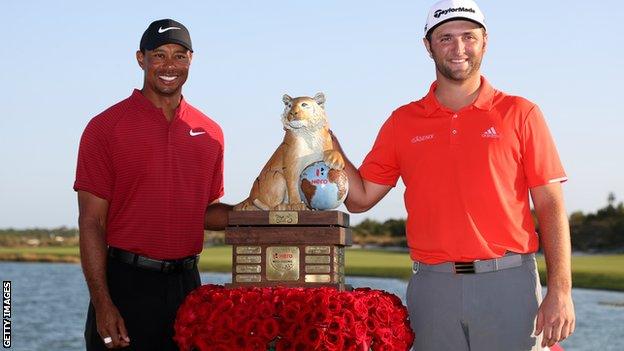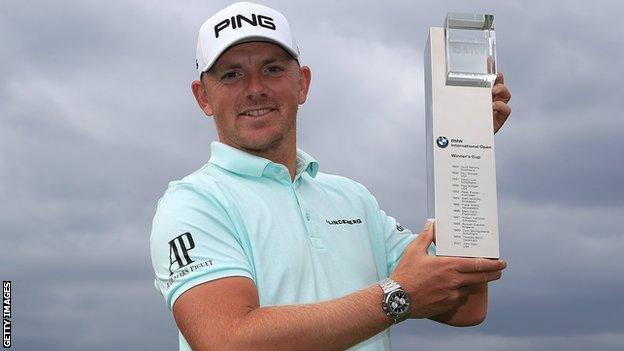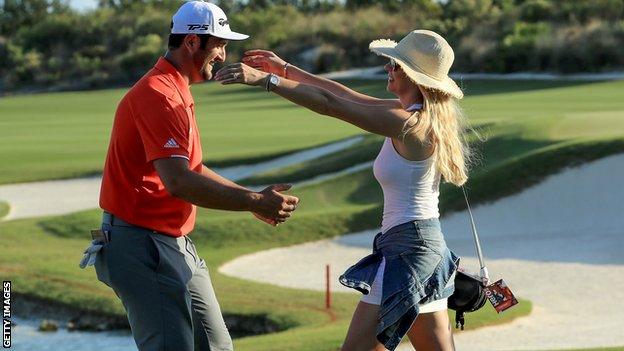Tiger Woods' World Challenge event highlights flaw in golf's ranking system
- Published
- comments

Tiger Woods presents Jon Rahm with the winner's trophy at his Hero World Challenge event at the Albany resort in Nassau, Bahamas
Golf's world rankings are compromised by pandering to Tiger Woods' year-end jolly in the Bahamas.
It is a shame because the official standings do a fine job in determining the game's pecking order.
It is a complex business, reflecting play of differing standards all over the globe, yet the ranking boffins seem to come up with formulas that correctly highlight who should be climbing golf's ladders and who are landing on snakes.
It means that when a player misses out on an event because he is no longer of a high enough ranking, there is an immediate solution: play better golf.
And that is how the world's leading players see it. They know they are part of an ultra-competitive environment where the standards are incredibly high.
Humble amateurs are aware of who is the best player in their club and such golfers usually command plenty of respect. Yet these scratch or better handicap players could not live with the standards of an average touring pro.
Tens of thousands of players around the world aspire to Tour life; only a relative handful are ever good enough to make a living from playing the game.
They are sometimes referred to as journeymen, these golfers who make their share of cuts but rarely trouble the leaderboard operators. But to refer to them as such is an insult.
These are elite competitors, scrapping for every euro, dollar and, just as crucially, ranking point they can get their hands on. They have achieved this position through relentless practice to capitalise on their talents of technique and temperament.
If the prize money makes them a living, the ranking points give them a career. Each success brings the opportunity for more.

Matt Wallace after winning the BMW International Open in Cologne in June, one of the Englishman's three victories on the European Tour this year
Take a player such as Matt Wallace. He has famously clambered from the lowly Alps Tour to the foothills of the European Tour and could now scale the golfing heights after winning three tournaments over the past 12 months.
This time last year Wallace was 130th in the world. The 28-year-old Londoner is now up to 44, safely ensconced in the world's top 50.
Wallace can look forward to his first Masters invitation dropping through his letterbox in the coming weeks and plan a schedule including the other majors and World Golf Championships.
These elite tournaments carry the biggest world ranking points and, therefore, more opportunities to better his standing. Of course, this also means pitting his game against the best players in the world and only if he is good enough will he prosper further.
In the United States, Bryson DeChambeau has had an even more spectacular rise. The 25-year-old Californian has rocketed from 99 in the world to number five.
With four PGA Tour wins among a host of top 10s, there can be no argument over his ranking - once again the boffins' formula has worked a treat.
But for the system to work properly it needs integrity, and the awarding of ranking points to Woods' Hero World Challenge event calls that into question.
Yes, last week's field was very strong - five of the world's top six were involved and Gary Woodland, who is 30th in the world, was the lowest ranked golfer in the field.
But there were only 18 players competing. They had all been invited, just as Woods had invited himself 12 months ago when he was officially ranked 1,199 in the world.
So there is no formal qualifying process. It was also easy to see that it has a more relaxed, end-of-term feel.

Jon Rahm is embraced by fiancee Kelley Cahill on the 18th green at Albany in Bahamas after earning a four-shot victory over Tony Finau in the Hero World Challenge
It is a fantastic event, Jon Rahm played very well to win it and we enjoyed watching - but did he deserve to climb from eight to six in the world as a result?
The Hero World Challenge has been given world ranking status since 2009 but last week's tournament brought the issue firmly back into focus. It had a rating of 48 points, the same as the Scottish Open, Dubai Desert Classic and Houston Open.
All of these events boast full and ultra-competitive fields. They are proper tournaments with proper consequences - Ian Poulter played himself into the Masters with his Houston win last April.
Players in these tournaments are giving absolutely everything to preserve and enhance their standing in the game. This is the essence of professional golf and it is far removed from a cosy, end-of-season gathering in the Bahamas at the behest of Woods.
Here we have an example of the authorities bending over backwards to accommodate the game's biggest star, and that should not happen in a sport based on transparent meritocracy.
Twelve months ago, Woods' appearance marked the beginning of his spectacular comeback. Outside the top 1,000 then, he had a chance to crack the top 10 with victory on Sunday.
The chance was spurned as he finished 17th of the 18, but had he won it would have been Woods rather than Rahm occupying the number six spot this week.
Woods, a 14-time major champion, has performed wonders this season; winning the Tour Championship was a stellar way to return to golf's top table.
Winning his own end-of-season exhibition would have been a fitting end to the year, but an artificial and unsatisfactory way to complete his long-awaited return to the top 10.